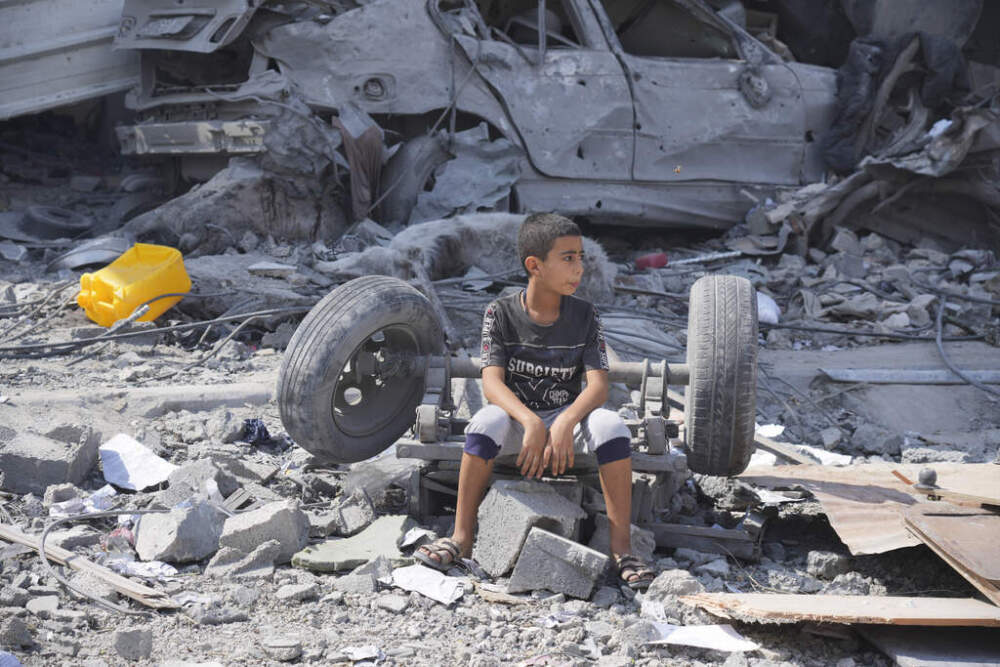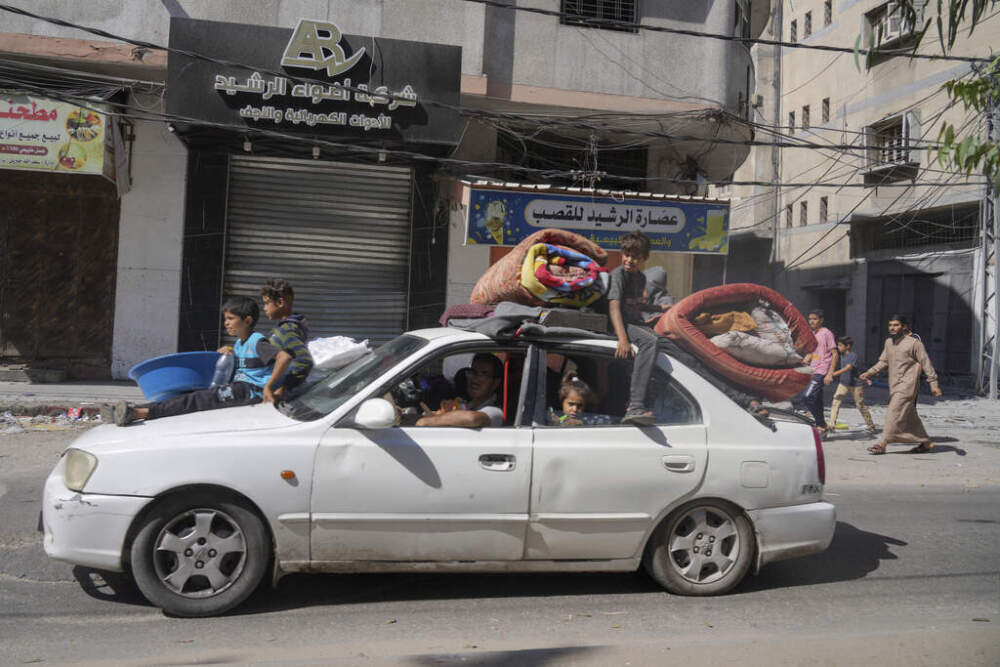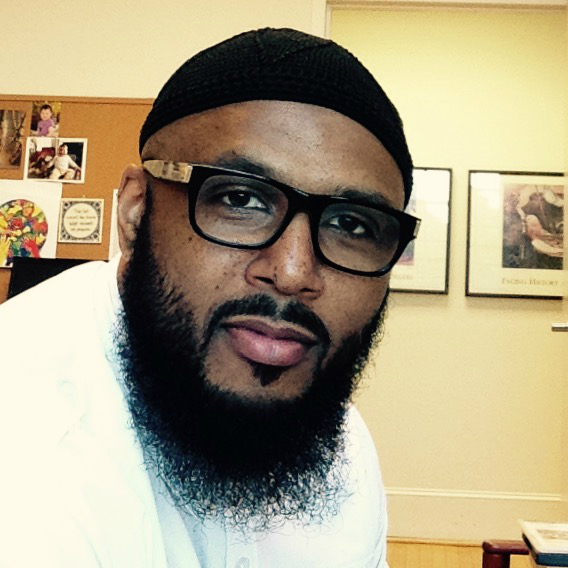Advertisement
Commentary
The politics of war must have a place for love

Since Hamas's heinous attack against Israel on Oct.7 — which killed more than 1,400 people, many of them civilians — I’ve received many calls from leaders of interfaith organizations, who feel compelled to put out statements.
They are calling me for advice. They want to go on the record, but are torn between their moral conscience, and standard, aggressive public opinion that states Israel has a blank check to seek revenge.
Between Oct. 7 and Oct. 12, the Israeli Air Force — by its own count — dropped more than 6,000 bombs on Gaza, killing close to 2,750 Palestinians, including 724 children, and injuring 9,700 according to the Gaza health ministry. Just yesterday, hundreds of Palestinians were killed in an explosion at a hospital in Gaza City where civilians had been sheltering. The health ministry in Gaza blamed an Israeli airstrike; the Israeli military said an Islamist group aligned with Hamas was responsible.
The fatalities on both sides of this conflict are staggering. The numbers just become formulaic — 1,400, 2,750. But each one is a human being, whose mother bore him or her. Each soul had a life and carried dreams and hopes. Now, gone. Forever.
Israel has also cut off the flow of food, medicine, water and electricity to the territory, and has issued an evacuation order for northern Gaza, in advance of what seems likely to be a full-scale ground invasion. About half of Gaza’s 2 million people have been displaced, but there is nowhere to go. No one will take them.
War is the only time violence is acceptable when picking a side. But violence comes in many forms.
War is the only time violence is acceptable when picking a side. But violence comes in many forms. Some violence spills blood and other violence produces displaced families, poverty and deprivation. Both are lethal.
What makes the current situation awkward for faith leaders like me, who have strong ties to the Jewish and Muslim communities, is that picking a side means you may have to compromise these ties, and possibly lose some. There’s no way around it. It’s a nasty, ugly truth.
I have great affection for the Jewish people. Their traditions, and civilization are rich with wisdom and compassion. I have worked alongside Jewish people, eaten at their tables, learned from them and admired them.
For me, however, the politics of Israel are separate and apart from my affection for my Jewish colleagues. I know that for many people of Jewish faith, criticism of Israel is tantamount to minimizing the survival of the Jewish race. I am always striving to remain aware of that. But as a respectable Muslim leader I cannot stand idly by.
Advertisement
Any ruler, regardless of their political position, must take care not to dehumanize those under their charge.
I denounce the terrorist actions of Hamas. But I must stand with the Palestinians, who as a people, have also endured immense suffering. For more than 500 years, they have been oppressed under foreign rule, beginning with Ottoman Empire, then the British crown, then Jordanian rule and now, Israeli politics.
Any ruler, regardless of their political position, must take care not to dehumanize those under their charge. Yet Israeli Defense Minister Yoav Gallant called Palestinians “human animals.” This is the same language used as justification by Nazis against millions of Jews during the Holocaust. I’m sure most people of Jewish faith don’t agree with Gallant’s statement, but they are not in charge — he is.
As Nick Kristof wrote in in the New York Times earlier this week:
“Everyone expects Israel to hit back. The practical question is how far to go: In the bluntest terms, for Israel, how many dead Gazan children are too many?”
I ask: Why does the Israeli government seem to possess an open license to obliterate Gaza, killing thousands of innocent civilians? How many buildings are they allowed to bomb? For how long? Until the regime’s thirst for revenge is quenched? Is that in six days? Six months? Six years?
Humanitarian organizations, including UNICEF, the Red Cross, and many more are asking similar questions.

Israel’s democracy is in trouble. In the past year, Israeli Prime Minister Benjamin Netanyahu and his far-right Likud party have attempted to “take over Israel’s judiciary and other key institutions by eliminating the power of Israel’s Supreme Court to exercise judicial review.”
If Israel wants to be the democracy it claims to be, it must observe moderation, caution and prudence — even when defending itself against terrorists. If not, it’s just a right-wing regime that holds elections.
People like us who live in a western democracy, are somewhat faith-oriented and are concerned about the politics of the Middle East, have the luxury of having an opinion without the burden of dealing with the consequences of it.
The politics of war must have a place for love. There are two kinds. I love the Palestinian people with a private love; I pray with their families in America; I have cried for them. But I have a public love, for people of other faiths, that won’t allow me to dismiss their humanity. My public love tells me to call on all those who have faith to take a position, but to take it with humility and courtesy. I can love my Palestinian brothers and sisters, respect my Jewish colleagues, and condemn the actions of the Israeli government.
Use the blessing of being distant from the bloodshed and tragedy to bridge gaps and open dialogue.
This issue is a very human one. It’s nuanced, complicated and layered. If you find yourself caught in the middle of a political conversation, it’s OK to say, “I’m not sure.” It’s OK to admit, “I don’t know enough.” This has been my advice to friends and colleagues.
As much as we all want to appear brave, we aren’t. We’re all being cautious, and some people are very afraid to speak their truth. Christian leaders I’ve spoken with off the record, have explicitly told me that they don’t specialize in Middle-Eastern politics and haven’t had time to research this issue enough to have an informed balanced perspective. One said, “How do I leave my personal feelings out of this without hurting my own conscience? And how do I put out a statement without hurting someone in my interfaith constituency?”
I hope interfaith friendships can survive this turmoil. We have too much to lose — and too much at stake with future generations — to allow this moment of pain to disrupt many precious relationships that have taken years to cultivate and have born the fruit of empathy and understanding.
The war in the Holy Land has been raging before many interfaith relationships began. It didn’t stop us from forming them. We can’t allow the vitriol of this moment to take them away.
To people of all faiths, Jewish and Muslim: Use the blessing of being distant from the bloodshed and tragedy to bridge gaps and open dialogue. Don’t remain in your silos. Share your opinions — but bring them with civility and good will. I guarantee you’ll walk away better than how you came. Right now, that is the least we can do for one another.
